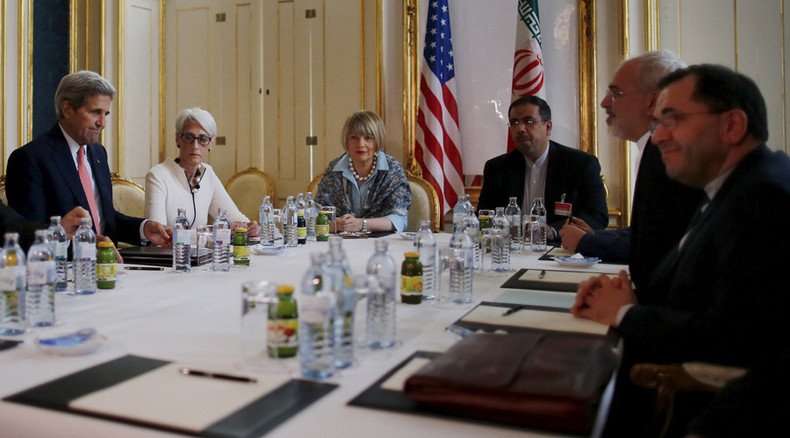Obama Plan B for Iran: Introduce long-term ‘Libya strategy’

Obama and the State Department’s plan for Iran is to slowly undermine the country while US hawks are still committed to Plan A, which is to immediately destroy Iran, says independent political analyst Dan Glazebrook.
The much-trumpeted nuclear deal with Iran is in danger of coming undone - with an increasing number of US lawmakers vowing to vote against it. The agreement sealed by world powers in Vienna last month will be debated in Congress next month.
RT: What are the chances that US lawmakers will derail the deal with Iran?
Dan Glazebrook: It’s possible, [it’s] hard to tell what will actually happen but it really shows the deep split within the US ruling class reflected in the US Congress. Going back to the days of George Bush, Iran was openly targeted for regime change; that was part of the ‘axis of evil’ and then of course there was that famous moment when Wesley Clark revealed the hit list of seven countries the US wanted to destroy after 9/11 and so on. Iran was on that list. The idea was deal with Iraq and move on to Iran. There are obviously some people who still are very much bent on that strategy: the destruction of the Iranian state is and should remain a US goal and the irony of it is that I don’t think the proponents in the US of this deal – Obama and so on in the State Department – I do believe they are still committed to that goal. What they have understood - which the hawks have not understood - is that their Plan A for regime change has failed. They failed to isolate Iran by destroying Syria, by destroying Hezbollah, all of that has failed. Assad is not going anywhere and so on.
READ MORE: Without Iran deal, there will be another war – Obama
So they have come out this Plan B that is more like the Libya strategy, which is “Ok we lift the sanctions, get a foot in the door, get businesses back, through which we can put in our people and so on and try and slowly undermine them that way”. If you look at Gaddafi, he thought he was safe; Libya thought they were safe after sanctions were lifted and they were doing business with the US and Britain. In fact, that whole period of so-called rapprochement was used to infiltrate MI6 people into the country, build up a fifth column within Libya in order to soften it up for renovation. So I think that’s what actually Obama and the State Department’s plan is. The problem for them – they can’t openly say that to Congress because that’s not the nature of politics. And the hawks, they don’t understand this, they are still committed to Plan A, which is just destroy Iran immediately. But it’s not possible.
RT: Barack Obama has been pressing Congress to approve the deal, but at the same time, he admitted that Iran could use sanctions-relief money to fund terrorism. Surely that won't help persuade those who doubt the deal, why did Obama bring it up?
DG: He is trying to argue that if we continue this policy of completely isolating and coldshouldering Iran then we are driving them to make these kind of alliances, we are driving them into the hands of Hezbollah, Syria, Russia and so on. If we sweeten them up with these deals, take off the sanctions, get our oil companies in there then maybe we can maneuver them away from these alliances, away from supporting Syria, maybe even get Iran to acquiesce in US bombing of Syrian government forces, etc. This is wishful thinking on Obama’s part, but obviously this is the kind of message he is trying to send out, “We force them into these alliances and we can get them out by offering them a sweeter deal.” It’s wishful thinking, but that’s what he is probably getting at.
The statements, views and opinions expressed in this column are solely those of the author and do not necessarily represent those of RT.
The statements, views and opinions expressed in this column are solely those of the author and do not necessarily represent those of RT.












